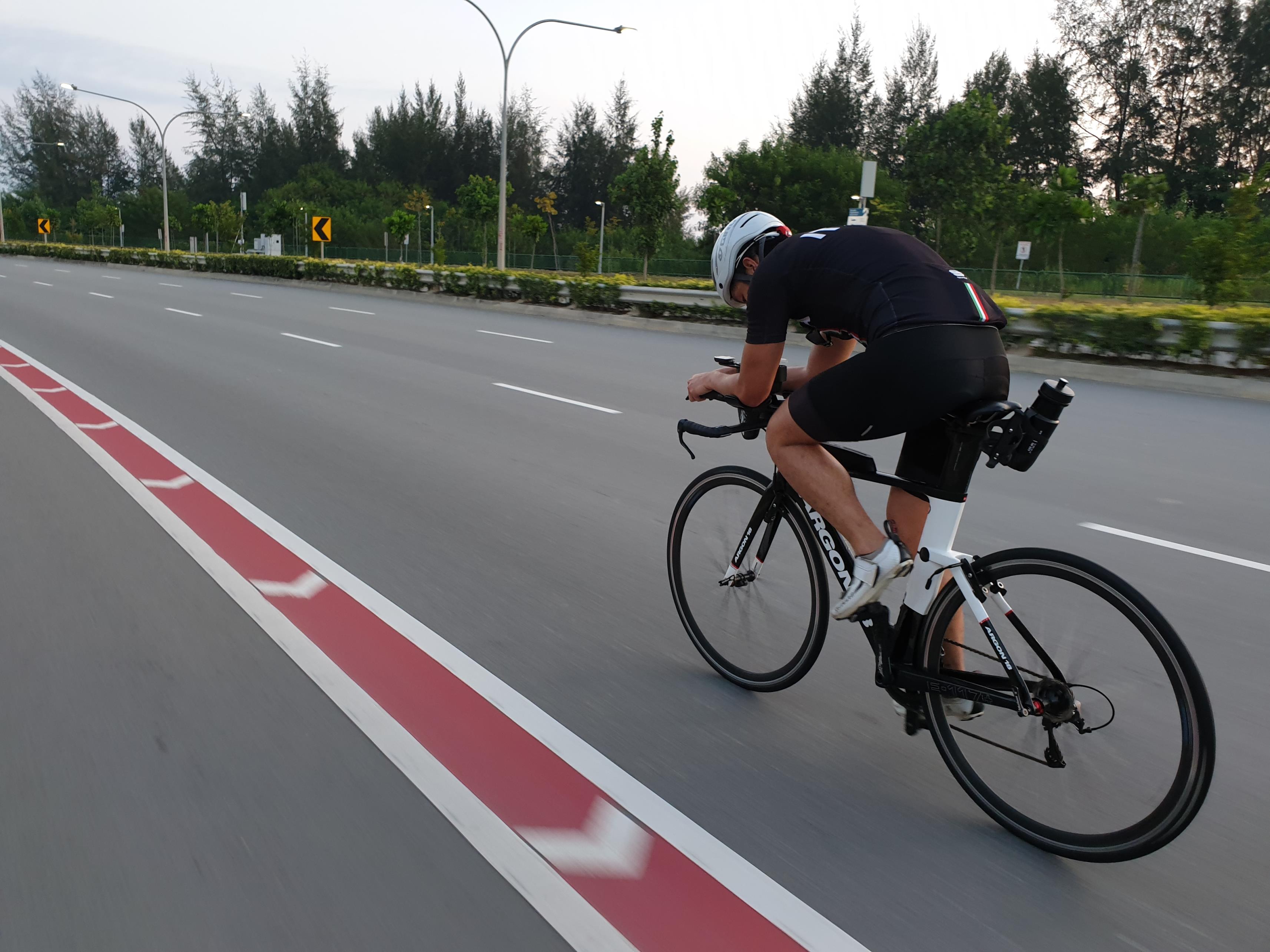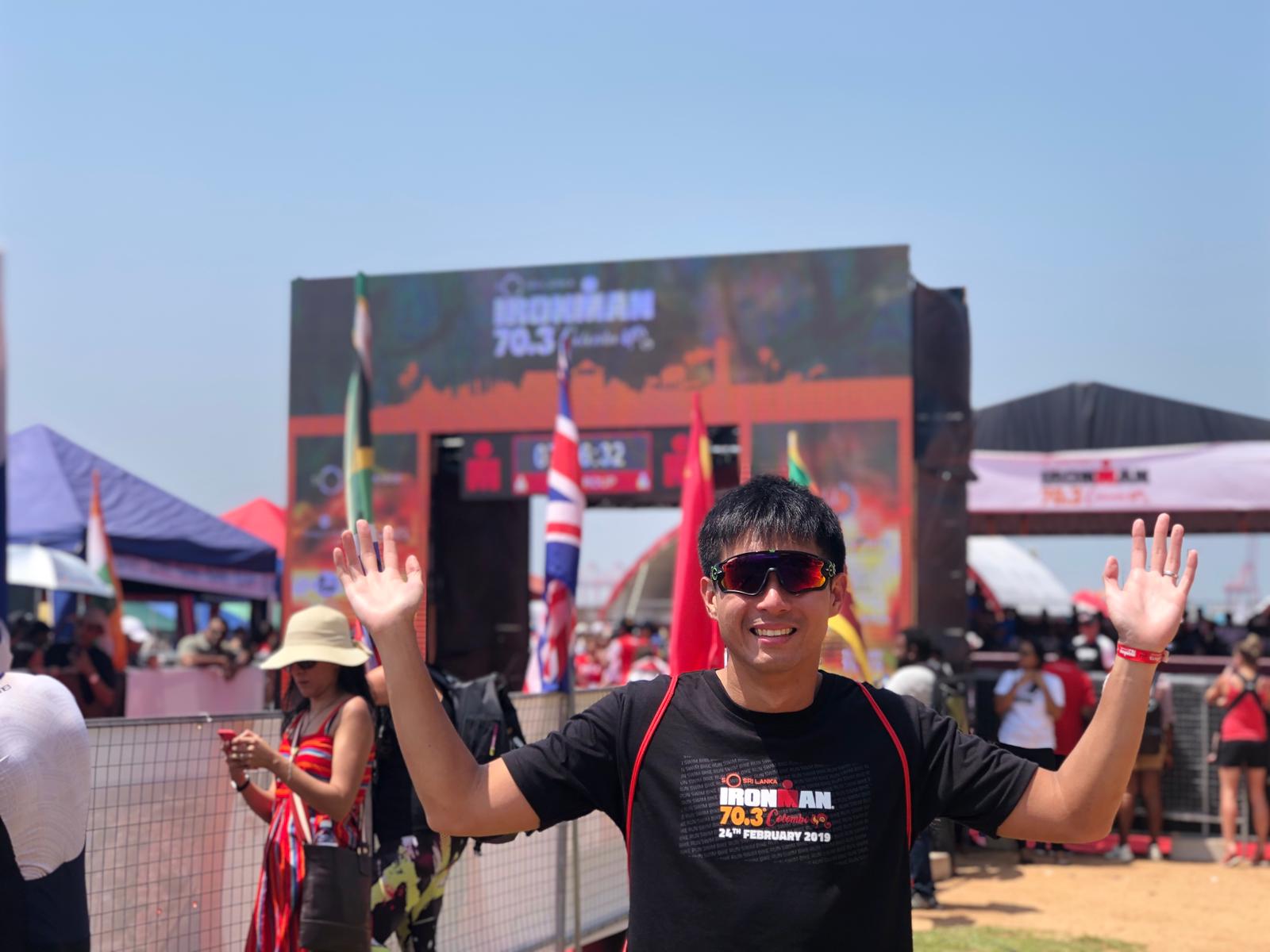I had actually done about 7 half-Ironman races prior to Sri Lanka but none of them were satisfactory. I never thought I was racing anywhere close to my potential and it always left me disappointed.

Coach's Notes: This is Daryl training for Sri Lanka 70.3 earlier this year. Quiet, unassuming and humble, I love working with him because of the no-fuss attitude that he brought to training. He did the work, communicated well and trust in the process. His consistency was rewarded with a great race and PB by 40 mins. Well Done mate!
First up - Tell us a bit about yourself. short background on work/ life/ sport etc etc / how did you come into tri?I'm a 30 year old junior technologist working in the investment banking industry. I have a very wonderful fiancee, Trudy and we will be getting married next year. I started triathlon during my university days. After realizing I was a decent runner, I decided to plunge into the world of swimming and cycling. I started with the sprint distance and worked my way up to a half Ironman.
What do you like about triathlon, what keeps bringing you back for more.
I feel that training for a triathlon keeps me disciplined and sharp. After a long day at work, a solid training session refreshes my mind and body. Every single training session gives me a sense of accomplishment and gets me ready for another day/week of work. When you finally race, you give everything you have and feel proud of achieving something not many people have the courage to do.
Tell us a bit about the journey - the ups and downs. The good and bad races experiences/ training with the squad compared to training alone.
I had actually done about 7 half-Ironman races prior to Sri Lanka but none of them were satisfactory. I never thought I was racing anywhere close to my potential and it always left me disappointed. I tried training under different coaches but somehow something wasn't right. Some coaches were too generic with their training programmes while some didn't cater to my work/life commitments. Training alone wasn't easy as I would get lazy and I had no one to guide me, especially in swimming. Therefore, I made it a point to consistently attend the Braves' squad swim sessions because I found that swimming with better swimmers always pushed me harder. With Shem on deck to remind me of my swim strokes, it helps to keep me focused and get rid of the bad habits.
How did you feel crossing the line?
I was very very happy. It may not seem like much to many, but I was very happy I finally went under 6hrs and was 40mins faster than my previous race. I also felt like I raced closer to my potential after so many years of disappointment. After the race, I also felt like I could do even better.

Briefly talk us through the race. High/ low points during the race. Standout thoughts at certain points in the race.
Overall, I thought I had a decent race. Colombo had a pretty straightforward swim course but I somehow managed to swim off course and wasted some time navigating back on course. As a result, my swim time wasn't as good as I thought it could be. However on the bike, I felt strong. The big gear strength sessions were paying off as I raced with a lower cadence. I felt a lot more comfortable and saw my average speed significantly increased as compared to my other races. Because I had a good bike, I didn't feel terrible on the run. I did cramp mid way into the half marathon which was probably due to a lack of nutrition (obviously didn't heed Shem's advice enough).
How did your physical training prepare you for the race? You can talk about your typical training week, our one on one catch ups to review your progress/ how we picked apart your game and worked on the areas that needed most improvement etc etc
A typical week consisted of 2 swims, 4 bikes (long ride on weekends) and 2 runs (long run on weekends). It was training every day and that worked out really well for me as my body adapted to the load. I always thought having a break once a week will be good but Shem's philosophy of training everyday (even if it's just a little) seemed to work better. For me, the bike programmes were the best and most beneficial. I always thought I had to ride at 90rpm cadence and somehow always lacked strength to ride fast over 90km. With the big gear strength sets, I grew stronger and my heart rate was lower when riding. There are of course times when you start to feel weary and Shem is always there to ask how I'm feeling and adjusts the training programme accordingly. To be honest, it was not just the physical training that helped me achieve the results. It was the way Shem's programme caters to my work/life commitments. He is realistic in setting the sessions based on the commitments I have. Hence, I was able to complete almost all of the sessions without fail.
Any mental hurdles that had to be overcome ? OR that were overcome on race day?
No actually. Because I felt much better prepared physically and nutrition-wise, I was actually more relaxed the night before the race and even on race day. This is vastly different from my past races where I worried about whether I would cramp on the bike/run or swim horribly. My fiancée can attest to that.
Please share with us the 2 most important 'take home' messages that you have learnt about endurance training and racing that everyone needs to hear.
First message: As Shem always says, while training is important, life is more important.
Second message: Nutrition, nutrition, nutrition is key.
I always stress the importance of communication in the coach -athlete relationship. Your thoughts on this please.
There is no doubt about this. My past coach-athlete relationships didn't work out as well because the coach wasn't able to understand my work/life commitments. I was left stressing over incomplete training sessions because I was too tired or that my schedule didn't fit. A good coach listens and of course a good athlete has to be honest with his/her time, as well as show commitment to the sessions prepared. Transparency is key.
Any 'life lessons' you've picked up along this journey?
Well being an endurance athlete does help with enduring difficult times at work.
What are the benefits of having a coach? The difference having a coach has made, compared to if you were to do this alone.. What are the characteristics for a good coach to look out for?
Countless. A coach helps to understand your needs and tailors a structured training programme suitable for your needs so you can achieve your goals realistically. It helps to prevent burnouts and also under-conditioning. A coach also helps to analyse your form to prevent injuries and improve technique for better performance. For me, a good coach is one with a great racing record, a good listener and a person who understands the every day athlete (work/life/family commitments).
What's next for you? Think you can go quicker... ?
The next goal is to do a 5-hr 70.3, then sub-5 and hopefully qualify for the world champs one day.


